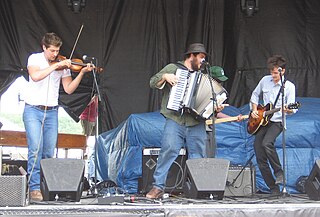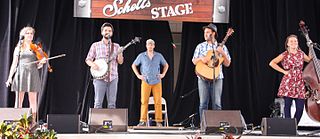
A hobo is a migrant worker in the United States. Hoboes, tramps and bums are generally regarded as related, but distinct: A hobo travels and is willing to work; a tramp travels, but avoids work if possible; and a bum neither travels nor works.

Fraggle Rock is a children's musical fantasy comedy puppet television series about interconnected societies of Muppet creatures, created by Jim Henson.
"An Invitation to Lubberland" was a broadside ballad first printed in 1685. Many believe that it inspired the hobo ballad which formed the basis of the song Big Rock Candy Mountain recorded in 1928 by Harry McClintock. Lubberland is the Swedish name for Cockaigne, land of plenty in medieval myth.

Harry Kirby McClintock, also known as "Haywire Mac", was an American railroad man, radio personality, actor, singer, songwriter, and poet, best known for his song "Big Rock Candy Mountain".

Bonanza is an American Western television series that ran on NBC from September 12, 1959, to January 16, 1973. Lasting 14 seasons and 431 episodes, Bonanza is NBC's longest-running western, the second-longest-running western series on U.S. network television, and within the top 10 longest-running, live-action American series. The show continues to air in syndication. The show is set in the 1860s and centers on the wealthy Cartwright family, who live in the vicinity of Virginia City, Nevada, bordering Lake Tahoe. The series initially starred Lorne Greene, Pernell Roberts, Dan Blocker and Michael Landon and later featured Guy Williams, David Canary, Mitch Vogel and Tim Matheson. The show is known for presenting pressing moral dilemmas.
"Whiskey in the Jar" is an Irish traditional song set in the southern mountains of Ireland, often with specific mention of counties Cork and Kerry. The song, about a rapparee (highwayman) who is betrayed by his wife or lover, is one of the most widely performed traditional Irish songs and has been recorded by numerous artists since the 1950s.

Cockaigne or Cockayne is a land of plenty in medieval myth, an imaginary place of extreme luxury and ease where physical comforts and pleasures are always immediately at hand and where the harshness of medieval peasant life does not exist. Specifically, in poems like The Land of Cockaigne, it is a land of contraries, where all the restrictions of society are defied, sexual liberty is open, and food is plentiful. Writing about Cockaigne was commonplace in Goliard verse. It represented both wish fulfillment and resentment at scarcity and the strictures of asceticism.
Children's music or kids' music is music composed and performed for children. In European-influenced contexts this means music, usually songs, written specifically for a juvenile audience. The composers are usually adults. Children's music has historically held both entertainment and educational functions. Children's music is often designed to provide an entertaining means of teaching children about their culture, other cultures, good behavior, facts and skills. Many are folk songs, but there is a whole genre of educational music that has become increasingly popular.

Dr. Byrds & Mr. Hyde is the seventh studio album by the American rock band the Byrds and was released in March 1969 on Columbia Records. The album was produced by Bob Johnston and saw the band juxtaposing country rock material with psychedelic rock, giving the album a stylistic split-personality that was alluded to in its title. It was the first album to feature the new band line-up of Clarence White (guitar), Gene Parsons (drums), John York (bass), and founding member Roger McGuinn (guitar). Dr. Byrds & Mr. Hyde is unique within the band's discography for being the only album on which McGuinn sings the lead vocal on every track.

Mulligan stew, also known as Hobo stew, is a type of stew said to have been prepared by American hobos in camps in the early 1900s.

Brokeback Mountain: Original Motion Picture Soundtrack refers to either or both the two-hour musical soundtrack edited into the 2005 film, Brokeback Mountain, and the recorded albums of music selected from the film. Some tracks have different performers substituted for those heard in the film. The entire chronological list of compositions in the two-hour soundtrack is annotated with notes about the film scenes.
"Don't Fence Me In" is a popular American song written in 1934, with music by Cole Porter and lyrics by Robert Fletcher and Cole Porter. Members of the Western Writers of America chose it as one of the Top 100 Western songs of all time.
"Hallelujah, I'm a Bum" is an American folk song, that responds with humorous sarcasm to unhelpful moralizing about the circumstance of being a hobo.

"Two Tickets to Paradise" is a song by American rock singer Eddie Money from his 1977 self-titled debut album, Eddie Money. It was released as a single in June 1978 and reached number 22 on the Billboard Hot 100. The song has since become a staple of classic rock radio, as well as Eddie Money's signature song.
"Charlie Brown" is a popular Jerry Leiber and Mike Stoller song that was a top-ten hit for The Coasters in the spring of 1959. It went to No. 2 on the Billboard Hot 100 singles chart, while "Venus" by Frankie Avalon was at No. 1. It was the first of three top-ten hits for the Coasters that year. It is best known for the phrase, "Why's everybody always pickin' on me?"
The Mellomen were a popular singing quartet active from the late 1940s through the mid-1970s. The group was founded by Thurl Ravenscroft and Max Smith in 1948. They recorded under a variety of names, including Big John and the Buzzards, the Crackerjacks, the Lee Brothers, and the Ravenscroft Quartet. They were sometimes credited as the Mellowmen, the Mello Men, or the Mellow Men. They sang backup to some of the best-known artists of the day, including Rosemary Clooney, Bing Crosby, Doris Day, Arlo Guthrie, Frankie Laine, Peggy Lee, Elvis Presley, and Jo Stafford.

The Felice Brothers are an American folk rock/country rock band from New York.

Jeneda Benally is the bassist and co-vocalist alongside her brothers in the Navajo punk rock band Blackfire. She currently plays bass and sings with her brother Clayson Benally in the multi-award-winning duo Sihasin.

"Nobody Knows the Trouble I've Seen" is an African-American spiritual song that originated during the period of slavery but was not published until 1867. The song is well known and many cover versions of it have been done by artists such as Marian Anderson, Lena Horne, Louis Armstrong, Harry James, Paul Robeson, Sam Cooke among others. Anderson had her first successful recording with a version of this song on the Victor label in 1925. Horne recorded a version of the song in 1946. Deep River Boys recorded their version in Oslo on August 29, 1958. It was released on the extended play Negro Spirituals Vol. 1. The song was arranged by Harry Douglas.

The Okee Dokee Brothers are an independent American bluegrass and American roots children's music duo from Minneapolis. Their 2012 CD/DVD release Can You Canoe?, with music and videos created during a 2011 paddle down the Mississippi River, won a Grammy for Best Children's Album in the 55th Grammy Awards. They released their second CD/DVD called Through the Woods in May 2014, with music and videos created during a 2013 trek up the Appalachian Trail. The album garnered a Grammy nomination in 2014. They traveled through the Southwest for another album and DVD, Saddle Up, which was also nominated for a Grammy in the best children's album category. Joe and Justin also published two picture books under Sterling Publishing titled Can You Canoe? And Other Adventure Songs and Thousand Star Hotel. Their primary branding artist, Brandon Reese, illustrated the books.












